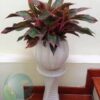Chinese Herbal Medicine Boiled Eggs: A Nourishing Delicacy for Health

Traditional Chinese medicine (TCM) has a rich history of utilizing food and herbs to promote overall well-being, improve vitality, and cure ailments. One such nourishing dish is Herbal Medicine Boiled Eggs, known as “Shuǐ Huà Dàn” (水花蛋) in Mandarin, which combines the delicate flavors of eggs with the health-enhancing properties of traditional Chinese herbs. This dish has been cherished for centuries in Chinese culinary culture, offering both a unique taste and a host of potential health benefits.
The combination of eggs and Chinese herbs in cooking isn’t just for flavor, but serves to create a balanced harmony between food and healing. In this article, we will explore the origins of Herbal Medicine Boiled Eggs, the types of herbs used, the health benefits, the methods of preparation, and much more. If you’re looking to incorporate a nourishing, traditional dish into your diet, this guide will provide you with everything you need to know.
1. The Origins of Herbal Medicine Boiled Eggs
Herbal Medicine Boiled Eggs belong to a long tradition of food therapy practiced in Traditional Chinese Medicine (TCM). The use of eggs in TCM is rooted in the belief that eggs are an excellent source of protein, amino acids, and vitamins that help maintain balance in the body, specifically the liver, kidneys, and spleen. When combined with Chinese herbs, which are thought to address specific ailments and imbalances, eggs become a vehicle for enhancing the medicinal properties of the herbs.
The practice of combining food and medicine has been prominent in Chinese culture for thousands of years. In ancient China, royal families and wealthy individuals would often seek the advice of herbalists and physicians to treat various ailments through diet. One popular remedy was the use of boiled eggs with Chinese herbs to nourish the body, improve health, and even boost longevity.
The origins of the dish can be traced to ancient herbal remedies used in Chinese food therapy, where the concept of yin-yang balance and the five elements (wood, fire, earth, metal, and water) were central. These concepts are foundational in understanding how different foods and herbs can balance the body’s internal energy and treat specific health conditions.
2. The Role of Chinese Herbs in Boiled Egg Recipes
In Chinese Herbal Medicine Boiled Eggs, the herbs used are typically chosen based on their ability to support specific organs and address particular health needs. Some herbs are used to nourish the blood, others to detoxify the body, and others to restore balance to vital energy (Qi). The herbs work synergistically with the egg’s nourishing qualities to promote overall health.
Here are some of the most commonly used Chinese herbs in this dish and their purported benefits:
1. Ginseng (人参 – Rénshēn)
Ginseng is widely regarded as a tonic that helps boost energy, enhance immunity, and reduce fatigue. It is commonly used in Chinese food therapy to restore vitality, making it a great herb for convalescence after illness or surgery. In the context of boiled eggs, ginseng enhances the dish’s ability to nourish the body and improve overall health.
2. Angelica Root (当归 – Dāngguī)
Angelica root is a staple in TCM, especially for women’s health. It is often called the “female ginseng” and is believed to have blood-tonifying properties, which help regulate menstrual cycles, improve circulation, and treat blood deficiencies. Angelica root also promotes the production of red blood cells, enhancing the body’s energy levels and vitality.
3. Goji Berries (枸杞 – Gǒuqǐ)
Goji berries are a popular ingredient in Chinese herbal cuisine due to their high antioxidant content and their ability to nourish the liver, kidneys, and eyes. Known for their rejuvenating properties, goji berries are often included in boiled egg recipes to improve vision, enhance skin health, and support immune function.
4. Chinese Red Dates (枣 – Zǎo)
Red dates are frequently used in Chinese cooking to enhance the taste and provide health benefits. They are often added to boiled eggs for their ability to tonify the blood, strengthen the spleen, and boost energy levels. Red dates are known for their sweet flavor and are commonly used to improve digestion and help with anemia.
5. Chinese Yam (山药 – Shānyào)
Chinese yam is a revered herb in TCM for its ability to strengthen the spleen and stomach, and support digestion. It is often added to egg-based dishes for its cooling properties, helping to balance heat in the body. In combination with eggs, Chinese yam is said to have a harmonizing effect on the digestive system.
6. Licorice Root (甘草 – Gāncǎo)
Licorice root is often used in herbal formulations to balance and harmonize the effects of other herbs. It is also known for its ability to soothe the digestive system, support detoxification, and strengthen the immune system. In the case of Herbal Medicine Boiled Eggs, licorice root adds a gentle sweetness while helping the body assimilate the other herbal ingredients.
7. Reishi Mushrooms (灵芝 – Língzhī)
Reishi mushrooms, also known as the “mushroom of immortality,” are renowned for their immune-boosting and anti-aging properties. They are added to herbal boiled egg recipes to enhance longevity and improve overall wellness. Reishi mushrooms support the body’s natural healing processes and can improve liver function, detoxification, and energy levels.
3. Health Benefits of Herbal Medicine Boiled Eggs
Herbal Medicine Boiled Eggs offer a variety of potential health benefits thanks to the combination of nourishing eggs and the healing properties of traditional Chinese herbs. Here are some of the top benefits associated with this dish:
1. Boosts Immunity
The addition of immune-boosting herbs like ginseng, goji berries, and reishi mushrooms can help strengthen the body’s defenses against illness. This dish is often recommended during cold and flu seasons to help prevent infection and increase the body’s resilience to disease.
2. Enhances Digestion and Metabolism
The ingredients in this dish, such as Chinese yam and red dates, are known for their ability to improve digestion and regulate metabolism. These herbs can help with bloating, indigestion, and poor appetite, while also supporting the body’s ability to absorb nutrients efficiently.
3. Nourishes the Blood
Chinese herbs like angelica root and red dates are commonly used to nourish the blood in TCM. By supporting the production of red blood cells and improving circulation, these herbs can help treat conditions like anemia and fatigue.
4. Improves Skin and Vision
Herbs like goji berries and red dates are packed with antioxidants, which can support healthy skin and improve vision. The combination of these herbs with eggs creates a powerful tonic for those looking to maintain glowing skin and sharp eyesight.
5. Balances Energy Levels
The rich combination of protein and vitamins from the eggs, along with the toning effects of the herbs, can help restore balance in the body’s energy levels. This dish is commonly used to combat fatigue and increase vitality, making it ideal for those recovering from illness or undergoing physical exertion.
4. How to Prepare Herbal Medicine Boiled Eggs
Making Herbal Medicine Boiled Eggs at home is relatively simple, though it requires sourcing specific Chinese herbs from traditional Chinese medicine shops or Asian supermarkets. Here’s a step-by-step guide to preparing this nourishing dish:
Ingredients:
- 4 eggs (preferably organic)
- 2-3 slices of ginseng
- 5-6 dried goji berries
- 3-4 Chinese red dates
- 1 small piece of Chinese yam (optional)
- 1-2 slices of angelica root (optional)
- 1-2 slices of licorice root (optional)
- 1 handful of reishi mushrooms (optional)
- Water (enough to cover the eggs and herbs)
Instructions:
- Boil the Eggs: Start by boiling the eggs in a pot of water. Bring the water to a boil, then reduce the heat and simmer for about 10-12 minutes for hard-boiled eggs. Once cooked, remove the eggs from the water and set them aside to cool.
- Prepare the Herbs: While the eggs are cooling, prepare the herbs. Rinse the goji berries, red dates, and Chinese yam (if using). Slice the ginseng, angelica root, and licorice root into thin pieces.
- Simmer the Herbs: In a pot, add the herbs along with enough water to cover the ingredients. Bring the water to a boil, then reduce the heat and let it simmer for about 20-30 minutes, allowing the herbs to infuse their flavors and medicinal properties into the water.
- Add the Eggs: Once the eggs have cooled, gently peel them and add them to the pot with the simmered herbal water. Allow the eggs to cook in the herbal broth for another 10-15 minutes, absorbing the flavors and nutrients from the herbs.
- Serve: Once the
eggs are fully infused with the herbal flavors, remove them from the pot. You can serve them as is, or you can slice them in half and garnish with a sprinkle of chopped scallions or a few extra goji berries. The broth can be served as a soup alongside the eggs, enhancing the meal’s nutritional benefits.
5. Conclusion
Herbal Medicine Boiled Eggs are a nourishing and health-boosting dish that combines the rich flavors of eggs with the therapeutic benefits of traditional Chinese herbs. Whether you’re looking to enhance your immune system, improve digestion, or nourish your blood, this dish offers a simple yet powerful way to support your overall health and well-being.
By incorporating this dish into your regular diet, you can enjoy the health benefits of TCM while also indulging in a comforting and satisfying meal. If you’re new to Chinese herbal cuisine, Herbal Medicine Boiled Eggs are a great starting point, offering an introduction to the healing potential of food and herbs combined.

